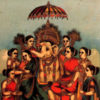Siddhis, the attainments. We usually think of attainments as things we have achieved in our activities, new skills developed, new awards earned. For many people just having an income they can feel comfortable with is an attainment, but what is it to achieve something anyway? What does it mean that you have learned something even?
Some achievements are fleeting. Others can allow you to expand your world in some way. Can you expand your world without expanding yourself?
They usually go hand in hand.
I’d say no, because you would retreat if you didn’t expand with it.
We look in the world for the answers to our problems. Technology promises such answers, medicine does too, but do they deliver? Does science offer us anything more than technology and medicine? We look in the world for the answers to our highly individual problems, how successful is that? I personally have had no luck with it.
It can be very hard.
Short lived maybe and problems keep surfacing and repeating.
The siddhis, or attainments, arise through self development, self knowledge. The essence of the processes occur in something that neuroscience has more or less recently discovered, as they say. What normally happens goes something like this.
We have a part of our brain that specializes in our self knowledge, tells us things like I’m hungry, or I’m sleepy, or I’m angry, right? And we have a task oriented part of our brain that learns skills and engages in activities, keeping track of all the things involved. This latter is something that seems like a big find to the scientific community as being fully immersed in it is apparently quite blissful, and training to deepen our immersion in that state seems to have profound performance enhancing benefits. They call this state “flow.”
That’s something I need to work on. My self knowledge part always seems to interrupt.
Actually, a great many forms of mental and even physical illness seem to take root not in the task oriented network, but instead in the default mode network or “self” part of the brain. They are just now developing a mechanical understanding of how it works. It apparently is even helpful in inducing something they call cognitive dis-inhibition, a sort of deep brain free association that seem to foster creative ideas and intuitive insight.
We [Native Hawaiian] have a practice that attacks illness not in that task network. We have a process called ho’oponopono. We also have lomilomi, both work away from the task end of illness. None of “what did you do” to get this, but more of where is your spirit working now and the first process can get very involved. Ah, in the system we get the word siddhi from, they call that shakti, and shakti is what creates the siddhis in a person’s mind. Shakkti = spirit.
Yes, our “cube” is the four pillars of “heaven” which is that state of mind heart though spirit, as thought of as being “complete immersion.” Siddha gurus are also said to do that, show “heaven” among other things.
Normally, we can only be in either the task oriented state or the self aware state. Activate one and you turn off the other. The flow state is described as causing one to forget themselves and the flow of time.
I’ve noticed that. You have to stop thinking about how you are feeling to get stuff done.
I think games like World of Warcraft bring this out in us when doing quests. Ah indeed, my wife and I get lost in that way when playing.
Well, in the same research, they also tested Tibetan Buddhist monks. The monks when examined differed from other people. While meditating they could activate both states simultaneously, merging the self aware state with the active state. This might be why they report experiencing a sense of unity with their environment, but they also now have what they think is a mechanical grasp on our degree of consciousness.
While you are awake, and normally conscious, the various parts of your brain are more or less in constant communication, an integrated web of communication. While you are sleeping but before the dreaming phase, they have discovered through trans-cranial magnetic stimulation that that network is shut off. The chain reaction they can induce in your brain while you are awake doesn’t happen in deep sleep. They can spark a signal but it stops there. They theorize that they can use this to measure your degree of consciousness, and well, remember the monks I mentioned? While they are meditating they are in a “higher” state of consciousness, one we don’t seem able to enter normally.
Your thoughts are welcome. Be well friends.
Travis Saunders
Dragon Intuitive
~science,mysticism,spirituality~



Leave a Reply